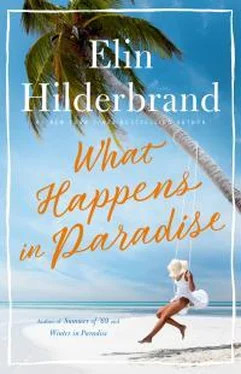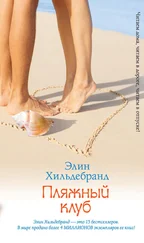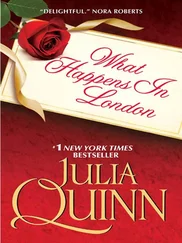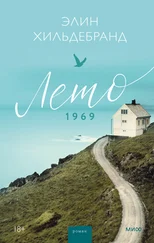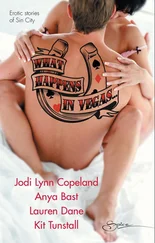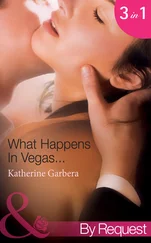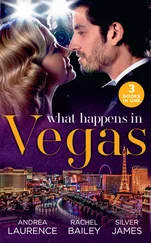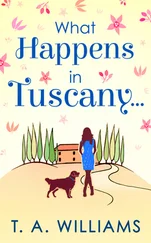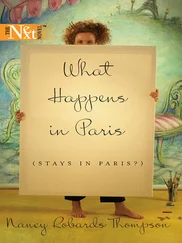Russell held out his arm like an old-fashioned gentleman caller. I sighed and hoped that maybe, just maybe, Oscar would be more afraid of violating his parole than of being shown up. I linked my arm through Russell’s.
From there, things happened fast. Oscar pushed Russell from behind and Russell let go of my arm and grabbed the front of Oscar’s shirt and they tussled while I searched the shadows for Woodrow on his golf cart—where was he?—and then, the next thing I knew, Russell from Iowa City had Oscar in a death grip and Oscar was gasping for air. It looked like Russell was about to snap his neck and I found myself fearing that Russell was going to kill Oscar instead of vice versa.
“Now,” Russell said in a calm-but-disappointed-assistant-principal voice, “I’m going to let you go. But you are to leave Rosie alone. Do you understand me?”
Oscar choked out an affirmative and Russell tightened his grip so that Oscar squeaked like a chew toy.
“It’s okay,” I said. “Thank you.”
Russell let Oscar go. Oscar buckled at the knees, stumbled a few yards away, and bent over in the grass, turning his neck to be sure it still worked.
Russell offered me his arm again.
“Where did you learn to do that?” I asked him once we were safely at my car.
“My father was a navy man,” Russell said.
I stood on my tiptoes and kissed his cheek. “My hero,” I said.
The next day, almost without thinking, I drove to the East End to Miss Vie’s at Hansen Bay. I was like a woman possessed because there was no good reason to go all the way out to that side of the island; normally, if I wanted to go to the beach, I parked at the National Park Service sign and hiked down to Salomon Bay. But I somehow convinced myself that, on the Saturday of the holiday weekend, even Salomon would be overrun and that the only way to escape the crowds would be to go to Hansen Bay. Besides which, now that it was in my head, I couldn’t shake my craving for Miss Vie’s garlic chicken and johnnycakes.
I told myself it had nothing to do with Russell from Iowa City. I wasn’t attracted to him, or I hadn’t been until the incident with Oscar—but having one’s honor defended is a mighty aphrodisiac. Still, Russell was old enough to be my father (I now know he’s forty-five, double my age), but that, in a way, was also attractive because what I was looking for was someone older, someone responsible and stable, someone adult. Oscar was older than me by seven years but emotionally he was a little boy who had a bone to pick with everyone.
I wore my white bikini and a white T-shirt knotted at the midriff and a pair of white denim shorts. White is my color.
There was a line of cars, all rentals, parked along the road near Vie’s. There was no telling if one of them was Russell’s or if he’d taken a taxi or if he was even there at all. The East End was a hike from everywhere and he might have decided to go fishing with his buddies or cruise over to the BVIs for lunch at Foxy’s. The second I stepped onto the beach and scanned the chaises in the shade, I saw him, settled back with a rum punch in hand.
When he spotted me, he smiled, and by smiled, I mean he beamed like I was the only person in the world he wanted to see.
“Rosie!” he said.
We hugged and he kissed my cheek and it was like seeing a friend, even though I barely knew him. He called over Flora, whom he already knew by name, and said he would pay for a second chaise and Flora waved a hand and said, “Rosie don’t need to pay, she’s family.” Which was actually true; Flora and Vie were second cousins of my father, Levi Small, and for that reason, they didn’t speak to my mother, so I didn’t need to worry about news of me visiting a white gentleman out at Hansen Bay getting back to her.
I ordered a Coke because I had to work at five and Russ ordered another rum punch and then together we ordered garlic chicken with rice and beans and johnnycakes. We stuffed our faces and we talked. I told Russ the long story of my relationship with Oscar and then he told me that he was down in the Virgin Islands because he had been offered a job with a hedge fund that was owned and operated by Todd Croft, whom he had known during his college years.
“At Northwestern?” I said, proud of myself for remembering.
“Todd flunked out freshman year but he hung around Winnetka and we had some business dealings.”
I laughed. “Business dealings? At eighteen?”
Russ sighed. “I haven’t even told my wife this story…”
“What?”
“Todd had a contact who wanted to sell alcohol to underclassmen in the dorm. My sophomore year, I was an RA—resident adviser—and in exchange for me looking the other way, Todd gave me a cut of his profits.”
“Russ!” I said. “I wouldn’t have pegged you as a criminal.”
“We never got caught,” Russ said. “I have a trustworthy face, I guess.”
“So I take it Todd has moved on from the smuggling business?” I said.
“High finance,” Russ said. “And I mean high. Todd is an impressive guy, though. He got a job working in one of those boiler rooms, calling people cold and encouraging them to invest money…and now his hedge fund is worth nearly three billion dollars.”
“No wonder you’re going to work for him,” I said. “What an opportunity.”
“For the past seventeen years, I’ve worked for the Corn Refiners Association,” Russ said. “But the pay is peanuts and my wife, Irene, is unhappy. She keeps a stiff upper lip. She’s from some pretty hardy Scandinavian stock, but I can tell she thinks I’m a failure. And most days I’m pretty sure she thinks about leaving me.”
“Oh my God,” I said. “She would have to be crazy to think about leaving you.”
He stared at me a second with a look of utter amazement and something changed between us then. I felt equal parts terrible and triumphant about it, but terrible won out and I didn’t even stay for a swim. I plunked down ten bucks for the food, offered Russ my hand, and said, “I wish all visitors to our fair island were like you, Russ. Thank you for your help with Oscar. I will forever be grateful.”
Russ held my hand and said, “Stay a little longer, can you?”
“Sorry,” I said. “I have some things to take care of before work.” My words were rushed and I tripped over a tree root as I hurried off the beach but I had to get out of there before I crossed a line. Though I knew a line had already been crossed. I had sought him out, worn my sexiest outfit, and said the words that I knew he needed to hear. I would like to say this was unwitting, but working in the service industry has given me keen people skills. I could tell that Russell from Iowa City was a people-pleaser and that his wife, Irene, made him feel like a disappointment and that hearing me say he was the opposite would all but make him fall in love.
He was married. Irene was waiting for him back home in Iowa. There were women on St. John—Tessie among them—who thought nothing of sleeping with men who were here on vacation. Tessie routinely had one-night stands with gentlemen who were staying at Caneel by themselves; that was one of the reasons I disliked her.
I was not going to sleep with Russell from Iowa City.
And yet, when I got to work at five o’clock and noticed the yacht was gone, I felt something like sorrow. My hero had left, and I couldn’t remember his last name. I would never see him again.
So imagine my surprise when, at seven o’clock, as the hibiscus-pink ball of the sun was sinking into the water and Lucinda Caruso was shooting me a smug glance from the table where her Harvard-educated ass was sitting with her Big Deal parents—a look that I could only assume meant that she had slept with Oscar after all, poor girl—Russ walked across the beach and into the restaurant. I blinked, wondering if it was a trick of the blinding light of the sun just before it set, but then he waved at me and I hurried over. “I thought you left,” I said. “The yacht—”
Читать дальше
